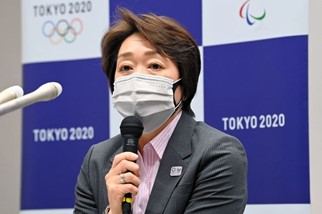EDITORIAL: Tokyo Olympic organizers need to stop whining and face reality

It will soon be a month and a half since the Tokyo Olympic and Paralympic organizing committee underwent a major overhaul, with Seiko Hashimoto as its new president and many women joining the board of directors.
But the committee is still floundering and causing problems, further deepening the public's disappointment and mistrust.
The most appalling example is its threat of legal action against the weekly Shukan Bunshun magazine over its report on the committee's plans for the Opening Ceremony.
Claiming that the publisher, Bungei Shunju, violated the Copyright Law and obstructed the committee's business by obtaining and partially leaking "secret information," the Olympic organizers are demanding that the publisher recall copies of the offending issue and also delete all online versions of the article.
It is an aberration when a public entity refuses to recognize its own failure at internal control, and tries instead to undermine the public's right to know by forcing a magazine publisher to retract and delete a report.
The Copyright Law allows the media to use copyrighted works within a scope that is justified as long as it is for reporting purposes.
As for the Opening Ceremony, the public's interest in it has remained high, partly because of repeated replacement of the top creative director, not to mention that the latest director had to resign after his plan involving a female entertainer turned out to be inexcusably offensive.
It was to be expected that Bungei Shunju refused to comply with the demands of the organizing committee.
What keeps peeping out from the committee's actions is its belief in the "supremacy of the Olympics"--that nobody can, or should, ever disagree with anything that is being done "for the sake of the Olympics."
This is precisely why the committee makes no effort to explain any issue that needs to be explained clearly and patiently if it is to win the understanding of the public.
Such is certainly not the right attitude, especially when the COVID-19 pandemic still shows no signs of abating and the purpose of holding the Olympics is being seriously questioned.
The same applies to the committee's handling of problems regarding Olympic test events.
The International Swimming Federation (FINA) on April 1 notified the Olympic organizers and others that it was considering canceling international qualifiers scheduled to be held in Japan during April and May.
The federation reportedly questioned Japan's COVID-19 response policy and immigration control measures, and the committee has to make timely and adequate explanations about the specific nature of the issues raised by FINA and whatever solutions the committee may have in mind.
Those test events and qualifiers are perceived as important factors in confirming the level of Japan's preparedness to hold the Olympics. And as such, they can affect other events and the overall Games themselves.
Naturally, questions and speculation are spreading in society.
Amid this unprecedented pandemic, some sort of confusion is unavoidable and understandable because it won't be easy to coordinate the interests of various athletic organizations and participating nations.
But this is precisely why it is the responsibility of the Olympic organizers to speedily analyze the situation and take necessary steps, so as not to cause miscommunication with the public.
The Olympic torch relay has begun, but concerns are being raised about the extent to which the promised infection prevention measures are being enforced, as well as to whether some event sponsors may have overstepped their bounds regarding self-promotion.
When Hashimoto became the president of the organizing committee, we asserted in an editorial that "information disclosure and thorough explanations are indispensable."
We believe these to be necessary even more strongly now.
--The Asahi Shimbun, April 7



